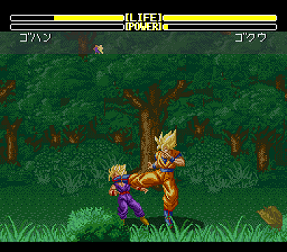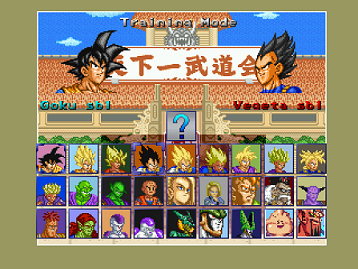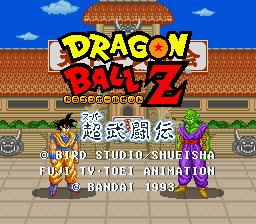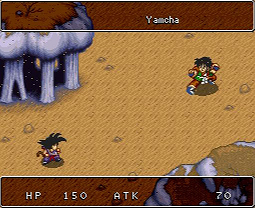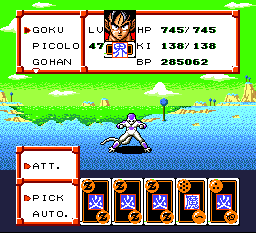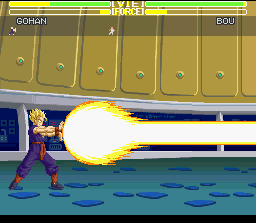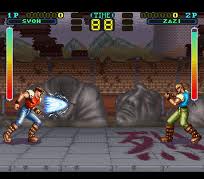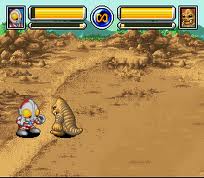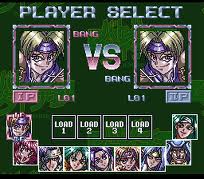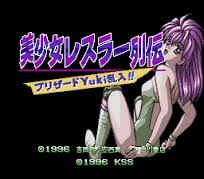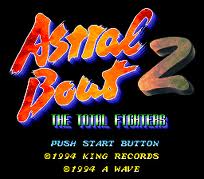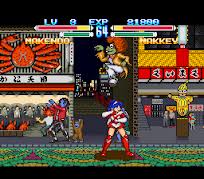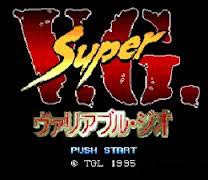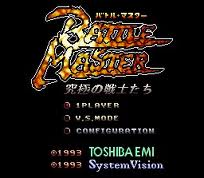Category: Fighting
88 game(s)All Fighting Games for SNES
Street Fighter II Turbo - Hyper Fighting
Street Fighter II' Turbo: Hyper Fighting (Japanese: ストリートファイターIIダッシュターボ -HYPER FIGHTING) is a competitive fighting game released for the arcades by Capcom in 1992. It is the third game in the Street Fighter II sub-series of Street Fighter games following Street Fighter II': Champion Edition. Released less than a year after the previous installment, Hyper Fighting introduced a faster playing speed and new special moves for certain characters, as well as further refinement to the character balance.
Hyper Fighting is the final arcade game in the Street Fighter II series to use the original CP System hardware. It was distributed as an upgrade kit designed to be installed into Champion Edition printed circuit boards.[1] The next game in the series, Super Street Fighter II, upgraded to the CP System II.
Dragon Ball Z - Super Butouden 2
Dragon Ball Z (Japanese: ドラゴンボールZ(ゼット), Hepburn: Doragon Bōru Zetto, commonly abbreviated as DBZ) is a Japanese anime television series produced by Toei Animation. Dragon Ball Z is the sequel to the Dragon Ball anime and adapts the last 325 chapters of the original 519-chapter Dragon Ball manga series created by Akira Toriyama, that were published from 1988 to 1995 in Weekly Shōnen Jump. Dragon Ball Z first aired in Japan on Fuji TV from April 25, 1989 to January 31, 1996, before being dubbed in several territories around the world, including the United States, Australia, Europe, India, and Latin America.
Dragon Ball Z follows the adventures of the protagonist Goku who, along with his companions, defends the Earth against an assortment of villains ranging from intergalactic space fighters and conquerors, unnaturally powerful androids and near indestructible magical creatures. While the original Dragon Ball anime followed Goku from his childhood into adulthood, Dragon Ball Z is a continuation of his adult life, but at the same time parallels the maturation of his son, Gohan, as well as the evolution of his rivals Piccolo and Vegeta from enemies into allies.
Due to the success of the anime in America, the manga chapters comprising its story were released by Viz Media under the title Dragon Ball Z. Additional works called animanga were released, which adapt the animation to manga form. Dragon Ball Z's popularity has spawned numerous releases which have come to represent the majority of content in the Dragon Ball universe; including 14 movies and 148 video games, many of them being only released in Japan, and a host of soundtracks stemming from this material. Dragon Ball Z remains a cultural icon through numerous adaptations, including a remastered broadcast as Dragon Ball Kai (ドラゴンボール改(カイ), Doragon Bōru Kai, lit. "Dragon Ball Revised") from 2009 to 2011 and from 2014 onwards.
Dragon Ball Z - Super Butouden
Dragon Ball Z (Japanese: ドラゴンボールZ(ゼット), Hepburn: Doragon Bōru Zetto, commonly abbreviated as DBZ) is a Japanese anime television series produced by Toei Animation. Dragon Ball Z is the sequel to the Dragon Ball anime and adapts the last 325 chapters of the original 519-chapter Dragon Ball manga series created by Akira Toriyama, that were published from 1988 to 1995 in Weekly Shōnen Jump. Dragon Ball Z first aired in Japan on Fuji TV from April 25, 1989 to January 31, 1996, before being dubbed in several territories around the world, including the United States, Australia, Europe, India, and Latin America.
Dragon Ball Z follows the adventures of the protagonist Goku who, along with his companions, defends the Earth against an assortment of villains ranging from intergalactic space fighters and conquerors, unnaturally powerful androids and near indestructible magical creatures. While the original Dragon Ball anime followed Goku from his childhood into adulthood, Dragon Ball Z is a continuation of his adult life, but at the same time parallels the maturation of his son, Gohan, as well as the evolution of his rivals Piccolo and Vegeta from enemies into allies.
Due to the success of the anime in America, the manga chapters comprising its story were released by Viz Media under the title Dragon Ball Z. Additional works called animanga were released, which adapt the animation to manga form. Dragon Ball Z's popularity has spawned numerous releases which have come to represent the majority of content in the Dragon Ball universe; including 14 movies and 148 video games, many of them being only released in Japan, and a host of soundtracks stemming from this material. Dragon Ball Z remains a cultural icon through numerous adaptations, including a remastered broadcast as Dragon Ball Kai (ドラゴンボール改(カイ), Doragon Bōru Kai, lit. "Dragon Ball Revised") from 2009 to 2011 and from 2014 onwards.
Dragon Ball Z - Super Gokuuden Kakusei Hen
Dragon Ball Z - Super Gokuuden Totsugeki Hen
Dragon Ball Z (Japanese: ドラゴンボールZ(ゼット), Hepburn: Doragon Bōru Zetto, commonly abbreviated as DBZ) is a Japanese anime television series produced by Toei Animation. Dragon Ball Z is the sequel to the Dragon Ball anime and adapts the last 325 chapters of the original 519-chapter Dragon Ball manga series created by Akira Toriyama, that were published from 1988 to 1995 in Weekly Shōnen Jump. Dragon Ball Z first aired in Japan on Fuji TV from April 25, 1989 to January 31, 1996, before being dubbed in several territories around the world, including the United States, Australia, Europe, India, and Latin America.
Dragon Ball Z follows the adventures of the protagonist Goku who, along with his companions, defends the Earth against an assortment of villains ranging from intergalactic space fighters and conquerors, unnaturally powerful androids and near indestructible magical creatures. While the original Dragon Ball anime followed Goku from his childhood into adulthood, Dragon Ball Z is a continuation of his adult life, but at the same time parallels the maturation of his son, Gohan, as well as the evolution of his rivals Piccolo and Vegeta from enemies into allies.
Due to the success of the anime in America, the manga chapters comprising its story were released by Viz Media under the title Dragon Ball Z. Additional works called animanga were released, which adapt the animation to manga form. Dragon Ball Z's popularity has spawned numerous releases which have come to represent the majority of content in the Dragon Ball universe; including 14 movies and 148 video games, many of them being only released in Japan, and a host of soundtracks stemming from this material. Dragon Ball Z remains a cultural icon through numerous adaptations, including a remastered broadcast as Dragon Ball Kai (ドラゴンボール改(カイ), Doragon Bōru Kai, lit. "Dragon Ball Revised") from 2009 to 2011 and from 2014 onwards.
Dragon Ball Z - Super Saiya Densetsu
Dragon Ball Z - Ultime Menace
Dragon Ball Z (Japanese: ドラゴンボールZ(ゼット), Hepburn: Doragon Bōru Zetto, commonly abbreviated as DBZ) is a Japanese anime television series produced by Toei Animation. Dragon Ball Z is the sequel to the Dragon Ball anime and adapts the last 325 chapters of the original 519-chapter Dragon Ball manga series created by Akira Toriyama, that were published from 1988 to 1995 in Weekly Shōnen Jump. Dragon Ball Z first aired in Japan on Fuji TV from April 25, 1989 to January 31, 1996, before being dubbed in several territories around the world, including the United States, Australia, Europe, India, and Latin America.
Dragon Ball Z follows the adventures of the protagonist Goku who, along with his companions, defends the Earth against an assortment of villains ranging from intergalactic space fighters and conquerors, unnaturally powerful androids and near indestructible magical creatures. While the original Dragon Ball anime followed Goku from his childhood into adulthood, Dragon Ball Z is a continuation of his adult life, but at the same time parallels the maturation of his son, Gohan, as well as the evolution of his rivals Piccolo and Vegeta from enemies into allies.
Due to the success of the anime in America, the manga chapters comprising its story were released by Viz Media under the title Dragon Ball Z. Additional works called animanga were released, which adapt the animation to manga form. Dragon Ball Z's popularity has spawned numerous releases which have come to represent the majority of content in the Dragon Ball universe; including 14 movies and 148 video games, many of them being only released in Japan, and a host of soundtracks stemming from this material. Dragon Ball Z remains a cultural icon through numerous adaptations, including a remastered broadcast as Dragon Ball Kai (ドラゴンボール改(カイ), Doragon Bōru Kai, lit. "Dragon Ball Revised") from 2009 to 2011 and from 2014 onwards.
Dead Dance
Battle Tycoon
Flash Hiders (Japanese: フラッシュハイダース?) is a 1993 fighting video game developed and published exclusively in Japan on December 19, 1993 for the PC-Engine Super CD-ROM².
Flash Hiders was followed by a 1995 sequel titled Battle Tycoon: Flash Hiders SFX, which was also released exclusively in Japan, but developed for the Super Famicom.
Bishoujo Wrestler Retsuden - Blizzard Yuki Rannyuu!!
Bishoujo Wrestler Retsuden: Blizzard Yuki Rannyuu is a Strategy game, published by KSS, which was released in Japan in 1996.
Sougou Kakutougi - Astral Bout 2 - The Total Fighters
Makeruna! Makendou 2: Kimero Youkai Souri
Makeruna! Makendou 2: Kimero Youkai Souri is an Action game, developed by Success and published by Datam Polystar, which was released in Japan in 1995.

